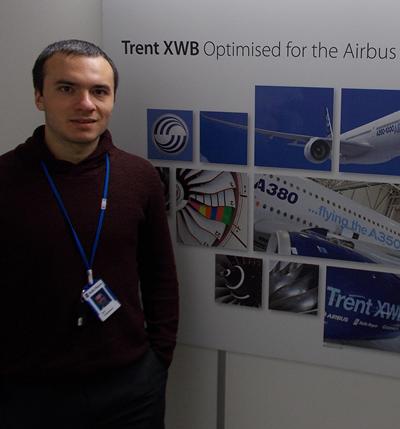Ion Costisanu MEng Mechanical Engineering / Sustainable Energy Systems, 2016
Manufacturing Engineering Graduate at Rolls-Royce Plc

My Group Design Project was a highlight of my time at university. The task involved the application of knowledge, experience, and approaches learnt in previous years and helped to reinforce my understanding of engineering principles. The knowledge and skills I developed from the project helped me bridge the gap between academia and working in industry.
Can you provide a brief summary of your time at Southampton?
I joined the University of Southampton in September 2011. It didn’t take long for me to realise that the University of Southampton had the environment and culture that perfectly mirrored my ambitions. It provided me with the tools I needed to equip myself with an engineer’s way of thinking. Throughout my time at university I was an active member of the debating society, represented the University at national Thai Boxing competitions, and completed summer jobs at major events such as the Olympics 2012, G8 Summit and Wimbledon.
What was the highlight of your time as a Southampton student?
In the second year we were working in teams of five to design and build a bridge with limited resources. We then loaded the bridges to see which team had the strongest and most effective structure. We probably took the prize for the worst bridge in history but it was really fun watching it collapse.
What did you enjoy most about your course?
The final year Group Design Project was my favourite part of the course. This task simulated a real life engineering cycle where we had to manage costs, generate concepts, design for manufacture, plan assembly, manufacture, test and validate an engineering project. This task involved the application of knowledge, experience and approaches learnt in previous years which further reinforced my understanding of engineering principles. The learning taken out of this project helped me bridge the gap between academia and industry. In fact, I need to do a similar project as part of my current graduate role at Rolls-Royce called Design & Make and I am more confident with this task after having completed a similar one at university.
What were your lecturers and supervisors like? Did you find them supportive?
When we joined the University we had a lot of classes, supervisions and labs. As we moved through the academic years, the classes reduced, but the work load increased. This formula helped me build initiative and think more independently around engineering problems, but, more importantly, helped me to develop an appreciation of working with other people on my course. In principle, if I identified the right problem, asked the right question, and provided a thinking solution, then I would always get enough guidance and help from lecturers and supervisors. I was more likely to get guidance in the thought process rather than a final solution. In addition, every student is allocated an academic tutor who can help with more personal issues such as performance, career aspirations, and references.
How did the facilities available at the University help you with your research and project work?
There are a lot of manufacturing and design facilities on campus. Every project I designed from first year all the way to fourth year was manufactured in university labs. Materials used for my project were also ordered through labs and bought from university-approved suppliers.
What is your current role?
I am currently on the manufacturing engineering graduate programme at Rolls-Royce plc. My role involves completing jobs in the following areas: increasing manufacturing capability for improved design flexibility, new product introduction, and continuous improvement. At the end of these placements, I will be doing a Design & Make project where we will be working in small teams to design and manufacture a product under a set budget and resources.
In what ways does the course you took at Southampton help you within your career?
The most important thing that I got out of university is how to think around an engineering problem. I probably don’t remember all of the specific information from my modules but I have learnt how to plot a road map of an engineering problem from initiation to completion. This allows me to visualise the solution of the problem which then helps me put together the right material and resources to solve it.
What has been your greatest career achievement so far?
Finding a job I am passionate about is probably my greatest achievement. This was not an easy task; I tried various internships and industries and I came to a conclusion that companies tend to shape a culture and environment depending on the product or service they provide, how they provide it, and the market they operate in. It is down to us (the students) to find if that particular environment is for us. I think finding a job in which an individual can perform well is crucial. I studied Mechanical Engineering at university but I moved towards manufacturing in industry which is slightly different. Making that decision was very difficult but it was the best decision I have taken related to my career.
What advice would you offer to potential University of Southampton students?
• Do as much work experience and complete as many internships as possible.
• If lecturers make you work independently, remember that this will benefit you massively in the future.
• Continually reflect on your skill gaps and find ways to get out of your comfort zone.
• Learn from your peers.